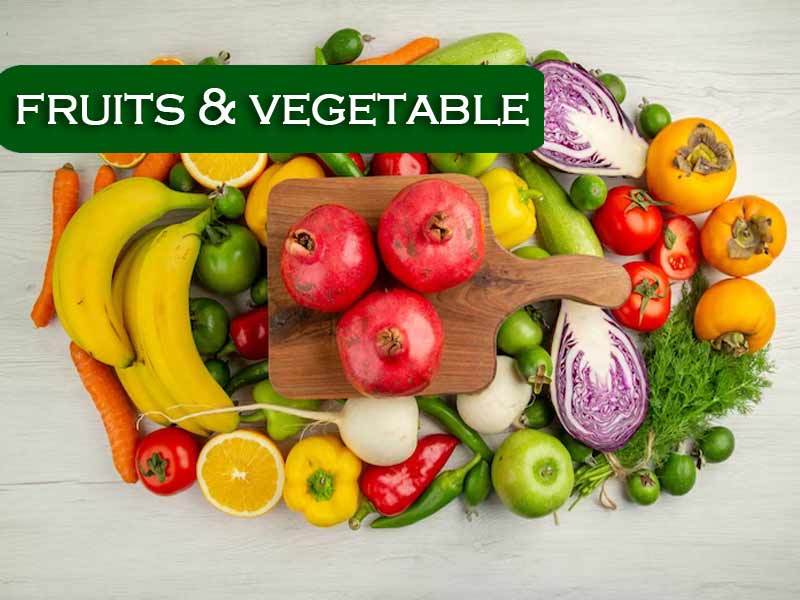What place do fruits have in healthy food? Here we answer this question.
Fruits are an important part of a healthy diet. They are packed with essential vitamins, minerals, and fiber that are necessary for good health. Fruits are also low in fat and calories, which makes them a great choice for people who are trying to lose weight or maintain a healthy weight.
Fruits contain a variety of vitamins and minerals that are important for good health, including vitamin C, potassium, folate, and fiber. Vitamin C is important for a healthy immune system and for the production of collagen, which is necessary for healthy skin, bones, and cartilage. Potassium is important for maintaining healthy blood pressure, and folate is necessary for healthy fetal development during pregnancy.
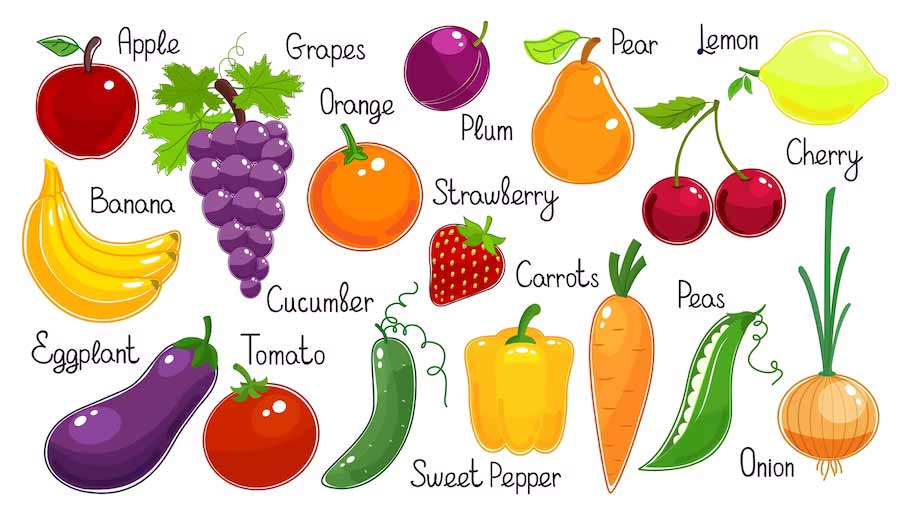
In addition to their nutritional value, fruits are also a good source of antioxidants, which help protect the body from damage caused by free radicals. Free radicals are unstable molecules that can damage cells and contribute to the development of chronic diseases like cancer and heart disease.
Overall, fruits should be a regular part of a healthy diet. The American Heart Association recommends consuming at least 4-5 servings of fruits and vegetables per day to help maintain good health.
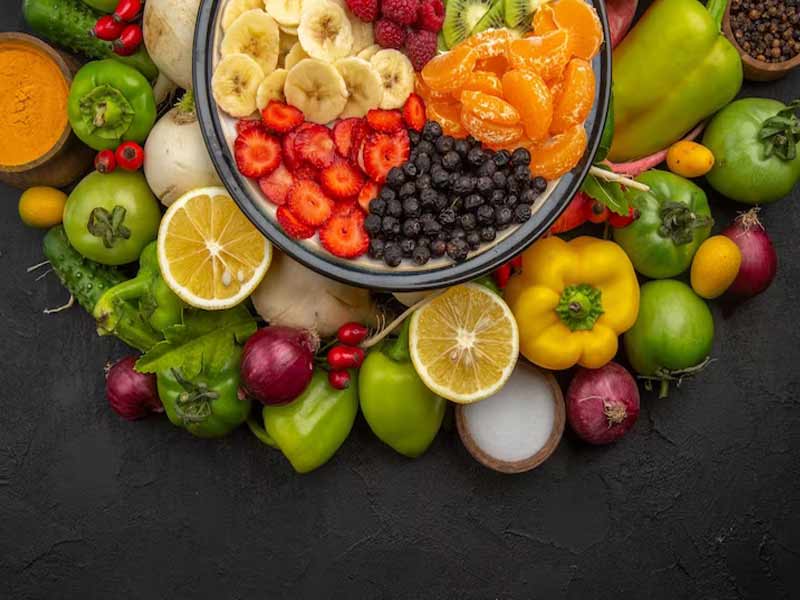
Some examples of commonly consumed fruits that can provide health benefits include:
- Apples: Apples are a great source of fiber, vitamin C, and antioxidants. They have been linked to a reduced risk of heart disease, stroke, and certain types of cancer.
- Berries: Berries, such as blueberries, raspberries, and strawberries, are packed with antioxidants and are a good source of fiber. They have been linked to improved cognitive function, reduced inflammation, and improved heart health.
- Citrus fruits: Citrus fruits, such as oranges, grapefruits, and lemons, are high in vitamin C and other antioxidants. They have been linked to improved immune function, reduced risk of kidney stones, and improved heart health.
- Bananas: Bananas are a good source of potassium, which is important for maintaining healthy blood pressure. They are also a good source of fiber and vitamin C.
- Avocados: Although technically a fruit, avocados are often used as a vegetable. They are high in healthy fats, fiber, and potassium. They have been linked to improved heart health, improved digestion, and reduced inflammation.
It’s important to note that while fruits are generally a healthy food choice, they can be high in natural sugars. For this reason, it’s important to consume fruits in moderation and to choose whole fruits rather than fruit juices or dried fruits, which can be high in added sugars.
Additionally, it’s important to consume a variety of fruits to get the full range of nutrients they offer. Eating a rainbow of fruits – red, orange, yellow, green, blue, and purple – can help ensure that you’re getting a diverse array of vitamins, minerals, and antioxidants.
It’s also worth noting that fresh, whole fruits are generally a healthier choice than processed fruit products, such as fruit juice, fruit snacks, or canned fruit packed in syrup. These products may be high in added sugars, which can contribute to weight gain and other health problems.
Incorporating fruits into your diet can be easy and delicious. Fresh fruits make a great snack or dessert, and they can be added to smoothies, salads, and other dishes for added nutrition and flavor. Aim to include at least one serving of fruit at each meal, and choose a variety of fruits throughout the week to ensure that you’re getting all the nutrients your body needs.
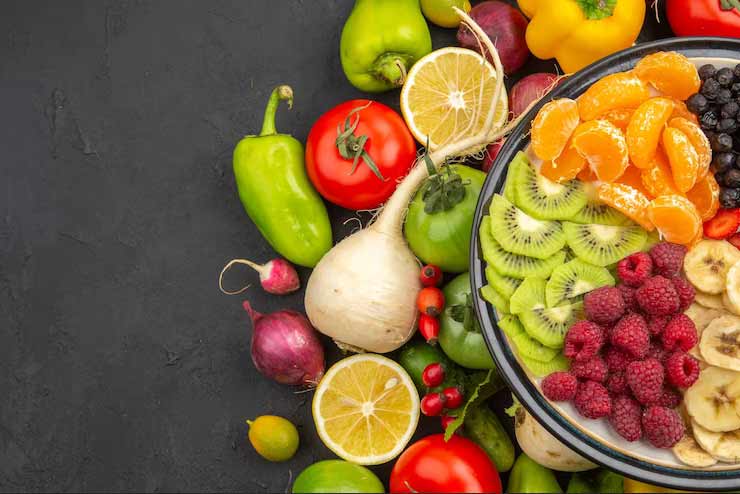
Here are a few tips for incorporating more fruits into your diet:
- Start the day with a fruit-based breakfast: Add sliced banana or berries to your oatmeal or cereal, or blend up a fruit smoothie.
- Make fruits the star of your snacks: Keep a bowl of fresh fruit on your counter, or pack a piece of fruit for an on-the-go snack.
- Experiment with different ways to enjoy fruits: Try grilling peaches or pineapple, or baking apples with cinnamon for a healthy dessert.
- Use fruits to add flavor to savory dishes: Add diced apples to your salad, or mix diced mango or pineapple into your salsa.
- Get creative with your fruit choices: Try lesser-known fruits like papaya, kiwi, or pomegranate to mix things up.
Remember, fruits are just one part of a healthy diet. It’s important to also include a variety of vegetables, whole grains, lean proteins, and healthy fats for optimal health. By eating a balanced diet that includes plenty of fruits and vegetables, you can help reduce your risk of chronic diseases, improve your energy levels, and support overall health and well-being.
What place do vegetables have in healthy food?
Eating a balanced and nutritious diet is essential for maintaining good health. Consuming a variety of vegetables is an important part of this diet, and the benefits of doing so are numerous. Vegetables are packed with essential vitamins, minerals, and nutrients that support optimal health and well-being. In this article, we will explore the place of vegetables in healthy food, their benefits, and the role they play in preventing various diseases.
The Nutritional Value of Vegetables
Vegetables are an excellent source of nutrients, including vitamins, minerals, and dietary fiber. They are low in calories and contain a range of essential vitamins and minerals that our bodies need to function optimally. Vegetables are also rich in antioxidants, which can help protect the body against harmful free radicals that can cause cellular damage.
The vitamins and minerals in vegetables are essential for a healthy diet. For example, vitamin C is crucial for maintaining healthy skin and boosting the immune system. Vitamin A is essential for good vision and a healthy immune system, while vitamin K is important for bone health and blood clotting.
Vegetables also contain a range of minerals, including potassium, magnesium, and calcium, which are important for healthy bones, muscles, and nerves. Potassium is particularly important for maintaining a healthy heart and blood pressure, while magnesium is essential for energy production and muscle and nerve function.
Dietary fiber is another essential nutrient found in vegetables. Fiber is important for maintaining healthy digestion, reducing the risk of heart disease and stroke, and regulating blood sugar levels. It also helps to keep us feeling full and satisfied, which can aid in weight management.
Types of Vegetables
There are many different types of vegetables, and each has its own unique set of nutritional benefits. Leafy greens, such as spinach and kale, are particularly nutrient-dense and are packed with vitamins and minerals. Cruciferous vegetables, such as broccoli and cauliflower, are rich in antioxidants and have been shown to have anti-cancer properties. Root vegetables, such as carrots and sweet potatoes, are high in fiber and contain a range of essential vitamins and minerals. Other vegetables, such as bell peppers, tomatoes, and cucumbers, are also rich in nutrients and are a great way to add variety to your diet.
The Benefits of Eating Vegetables and fruits
There are many benefits to eating a diet rich in vegetables.
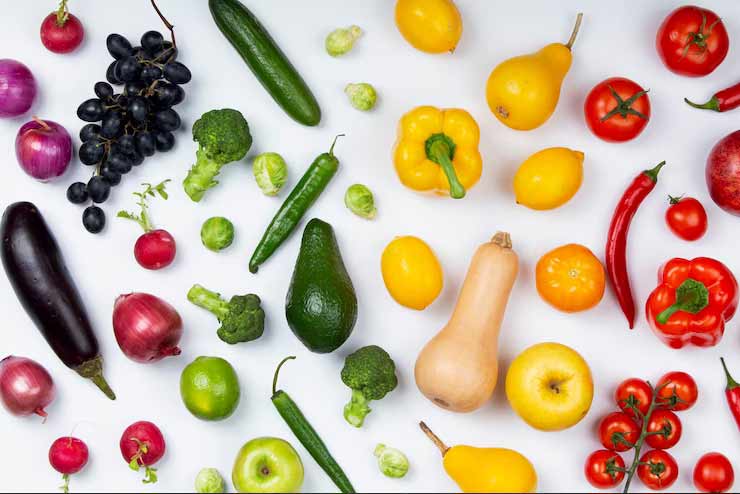
Here are some of the most important:
- Reduced Risk of Chronic Disease: Eating a diet rich in vegetables has been linked to a reduced risk of chronic diseases, such as heart disease, stroke, and certain types of cancer. This is due to the high levels of antioxidants and other nutrients found in vegetables, which help to protect the body against cellular damage.
- Improved Digestive Health: Vegetables are an excellent source of dietary fiber, which is important for maintaining healthy digestion. Fiber helps to keep the digestive system running smoothly and can reduce the risk of constipation and other digestive issues.
- Weight Management: Vegetables are low in calories and high in fiber, which can help with weight management. Eating a diet rich in vegetables can help to keep you feeling full and satisfied, which can reduce the amount of food you eat and aid in weight loss.
- Improved Energy Levels: The vitamins and minerals in vegetables are essential for energy production and can help to improve energy levels and reduce fatigue.
- Improved Mood: Studies have shown that eating a diet rich in fruits and vegetables can improve mood and reduce symptoms of depression and anxiety.
How to Incorporate More Vegetables into Your Diet
If you’re not used to eating a lot of vegetables, it can be challenging to incorporate them into your diet.
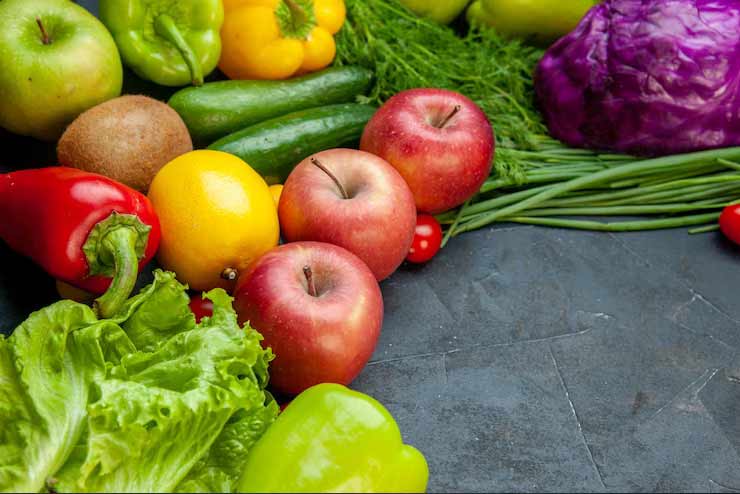
Here are some tips to help you get started:
- Start Small: Begin by adding a serving or two of vegetables to your meals each day. Over time, you can gradually increase the amount of vegetables you eat until they make up a significant portion of your diet.
- Experiment with Different Types of Vegetables: Try to incorporate a variety of vegetables into your diet, including leafy greens, root vegetables, and cruciferous vegetables. Experiment with different recipes and cooking methods to find new and exciting ways to prepare them.
- Make Vegetables the Focus of Your Meals: Instead of thinking of vegetables as a side dish, try to make them the focus of your meals. For example, you could make a vegetable stir-fry or a hearty vegetable soup.
- Use Vegetables to Replace Less Healthy Foods: Instead of reaching for processed snacks or sugary drinks, try to incorporate vegetables into your snacks and meals. For example, you could snack on raw vegetables with hummus or use lettuce leaves as a wrap instead of bread.
- Plan Your Meals in Advance: Planning your meals in advance can help you to ensure that you are getting enough vegetables in your diet. Try to plan your meals around the vegetables you want to eat, and make sure you have a variety of different types on hand.
There are many different ways to incorporate vegetables and fruits into your meals.
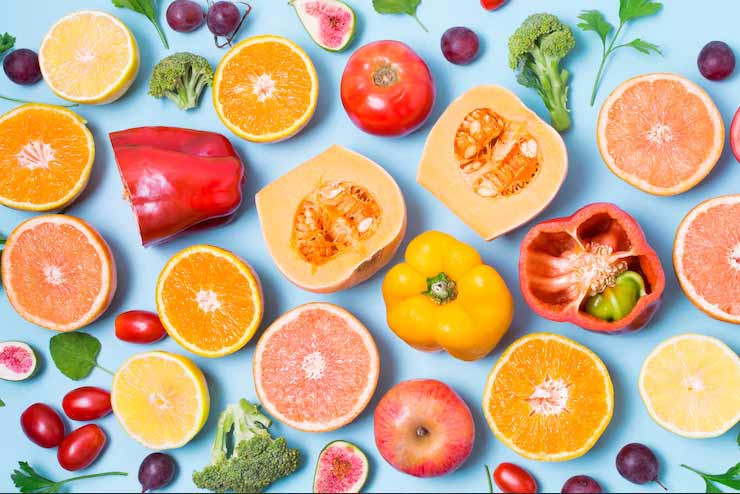
Here are some tips to help you get started :
Make vegetables the focus of your meal
One of the easiest ways to incorporate more vegetables into your diet is to make them the star of your meal. Instead of relying on meat or other protein sources to fill up your plate, start with a base of vegetables and build your meal around them.

For example, you could make a hearty vegetable soup, a stir-fry with lots of colorful veggies, or a salad with plenty of leafy greens, fresh herbs, and other veggies. By starting with vegetables, you’ll be sure to get plenty of fiber, vitamins, and other important nutrients in your meal.
Experiment with different types of vegetables
There are so many different types of vegetables to choose from, each with its own unique flavor, texture, and nutritional profile. Experimenting with different types of vegetables can help you find new favorites and keep your meals interesting and varied.
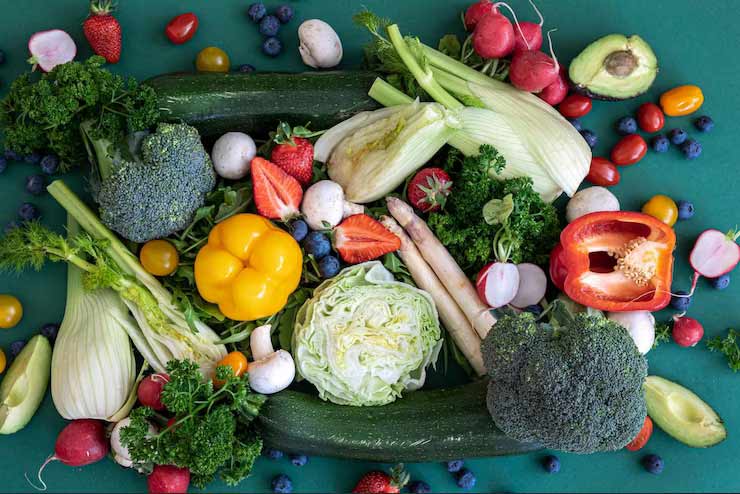
Some lesser-known vegetables to try include jicama, fennel, kohlrabi, and rutabaga. You can also experiment with different preparation methods, such as roasting, grilling, or sautéing your veggies, to bring out their natural flavors.
Plan your meals in advance
Planning your meals in advance can help you ensure that you’re getting a good balance of nutrients and prevent you from resorting to less healthy options when you’re short on time or energy.
When planning your meals, make sure to include a variety of vegetables, as well as other healthy sources of protein and carbohydrates. This will help you feel satisfied and energized throughout the day.
Try new recipes
One of the best ways to incorporate more vegetables into your diet is to try new recipes that feature veggies as the main ingredient. There are many cookbooks, blogs, and websites that specialize in vegetable-based recipes, so you’re sure to find something that appeals to your tastes and dietary preferences.
Some popular vegetable-based dishes include veggie burgers, zucchini noodles, roasted cauliflower steaks, and cauliflower rice. Don’t be afraid to get creative and experiment with different flavor combinations and cooking techniques.
Be mindful when eating
Finally, it’s important to be mindful when eating your vegetables (and all your food, for that matter). Taking the time to savor your food, chew slowly, and pay attention to how it makes you feel can help you develop a deeper appreciation for the flavors and textures of your food.
Mindful eating can also help you recognize when you’re full and prevent you from overeating or mindlessly snacking throughout the day.
In conclusion, vegetables are a critical component of a healthy and balanced diet. By incorporating more vegetables into your meals and experimenting with different types and preparation methods, you can enjoy all the health benefits of a plant-based diet while still satisfying your taste buds.
With a little bit of planning, creativity, and mindfulness, you can make healthy eating a sustainable and enjoyable part of your daily routine.
Additional tips for incorporating more vegetables into your diet
Here are a few more tips for incorporating more vegetables into your diet:
Keep it simple
You don’t need to be a gourmet chef to incorporate more vegetables into your diet. Simple preparations like roasting, steaming, or sautéing can bring out the natural flavors of vegetables and make them more enjoyable to eat.
Use dips and sauces
Dips and sauces can be a great way to add flavor and variety to your vegetables. Try using hummus, salsa, guacamole, tzatziki, or a yogurt-based dip to make your veggies more interesting.
Try new recipes
Don’t be afraid to try new recipes or cuisines that feature vegetables. Experimenting with different flavors and textures can help you find new ways to enjoy veggies and make healthy eating more enjoyable.
Make vegetables the star of the show
Instead of thinking of vegetables as a side dish or afterthought, try making them the main focus of your meal. For example, you could make a vegetable stir-fry, a veggie burger, or a hearty vegetable soup.
Get creative with presentation
Making your veggies look appealing can make them more enjoyable to eat. Try cutting them into interesting shapes, arranging them in a colorful salad, or using them as a colorful garnish for your dishes.
The last word is with you, the audience
Be sure to read other educational articles. For scientific issues, be sure to contact a specialist doctor. These materials are only for study and non-educational purposes. Of course, expert doctors can guide you a lot.
Our cooking training center has collected unique materials for you dear ones. This content is very useful and will help you cook the best and most delicious food for yourself and your loved ones at home.
The recipe section is for introducing the best dishes of the nations. Dear ones, you can see the best dishes in this section and cook whatever you want at home. Don’t forget to read the recipe and ingredients before doing anything to determine your cooking needs.
Soon we will be with you with a more professional team with more facilities. We suggest that if you are overweight, fill out the and wait for our experts to contact you and send you the right meal plan.
The slogan we put on our site is to fight obesity. In this regard, we will provide you with many suitable recipes. Be sure to follow our site to learn about many healthy foods. Do not forget that a healthy life requires extensive changes. One of these changes is changing food. So eat healthy
Please follow us on linkedin. You can learn all best french food recipe and best Italian food recipe and best arabic food recipes and best Iranian food recipes you can check our Reddit page.
